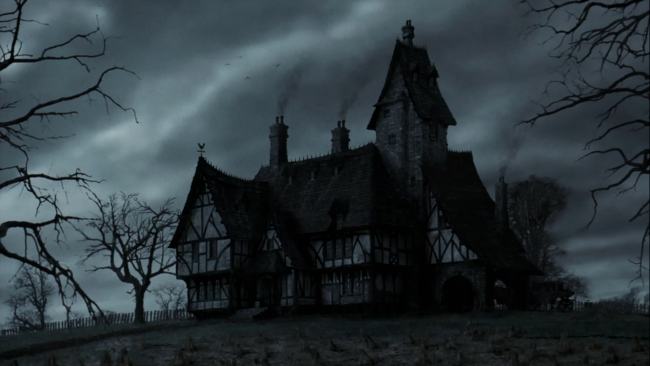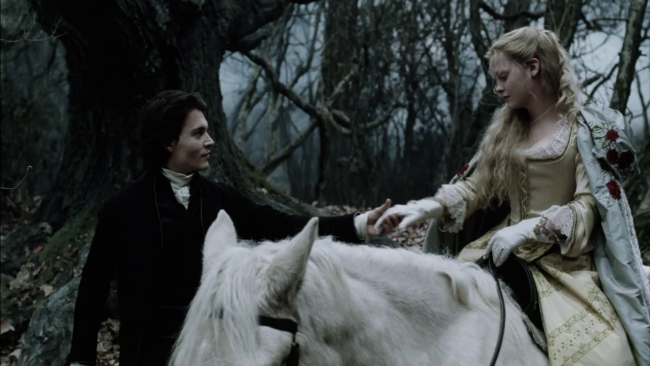
One day you wake up and find the world has changed around you with seeming abruptness. There are strange faces and familiar ones look on you without recognition. Political opinions that once seemed perfectly mundane and inoffensive now excite outrage from everyone in your village. Finally you start to doubt your own identity--after all, some schools of thought would say your identity is defined by how you fit into society. You've had the Rip Van Winkle experience.
I felt like I had to do something to celebrate American Independence Day yesterday but every idea I thought of felt too depressing. All of the usual things that made me feel good about the U.S. just made me feel sad and slightly filled with dread. I found myself thinking longingly of another BBC Shakespeare production to watch. Maybe that's why I thought of Washington Irving whose collection of stories and essays, The Sketch Book of Geoffrey Crayon, serialised from 1819 to 1820, largely consists of Irving's ruminations and daydreams about England. Ironic considering two of its stories, "Rip Van Winkle" and "The Legend of Sleepy Hollow", are two of the earliest and most famous examples of American fiction.
Maybe it's natural after such upheaval that someone would stop and ruminate on all that was inevitably lost. That's not exactly what Irving is up to, though.
I read "Rip Van Winkle" again last night and, like much of the rest of the collection, it's the kind of peculiarly effective comedy that comes from a blend of humour and melancholy. One of the funniest and potentially saddest aspects of it is, for as startlingly different as the world is when Van Winkle wakes up, in many ways it really hasn't changed at all.
It was some time before he could get into the regular track of gossip, or could be made to comprehend the strange events that had taken place during his torpor. How that there had been a revolutionary war—that the country had thrown off the yoke of old England—and that, instead of being a subject to his Majesty George the Third, he was now a free citizen of the United States. Rip, in fact, was no politician; the changes of states and empires made but little impression on him . . .
Of course, few things seem to infuriate political people more than people who aren't political--anyway, it seems a solid pretext to get on a soapbox. Poor Rip, when he first tries to make a statement to pacify the assembled people at the inn when he returns home, says;
“Alas! gentlemen,” cried Rip, somewhat dismayed, “I am a poor, quiet man, a native of the place, and a loyal subject of the King, God bless him!”
Here a general shout burst from the bystanders-“a tory! a tory! a spy! a refugee! hustle him! away with him!”
Even asking if anyone recognises the name Rip Van Winkle is no help, it only takes him into dark existential woods:
“Does nobody here know Rip Van Winkle?”
“Oh, Rip Van Winkle!” exclaimed two or three. “Oh, to be sure! that’s Rip Van Winkle yonder, leaning against the tree.”
Rip looked, and beheld a precise counterpart of himself as he went up the mountain; apparently as lazy, and certainly as ragged. The poor fellow was now completely confounded. He doubted his own identity, and whether he was himself or another man. In the midst of his bewilderment, the man in the cocked hat demanded who he was, and what was his name?
“God knows!” exclaimed he at his wit’s end; “I’m not myself—I’m somebody else—that’s me yonder-no—that’s somebody else, got into my shoes—I was myself last night, but I fell asleep on the mountain, and they’ve changed my gun, and everything’s changed, and I’m changed, and I can’t tell what’s my name, or who I am!”
That his now grown son not only has the same name but apparently the same characteristics and occupies the same place in the mind of the public must be bewildering. Both Rips are described as having a reputation for laziness though Rip Sr. "would never refuse to assist a neighbour even in the roughest toil, and was a foremost man in all country frolics for husking Indian corn, or building stone fences; the women of the village, too, used to employ him to run their errands, and to do such little odd jobs as their less obliging husbands would not do for them."
We're told Rip's chief trouble in life is his wife who endlessly upbraids him for his contented idleness. Irving's attitudes about women, displayed more fully in a preceding essay in the collection called "The Wife", are not misogynist but certainly influenced by a sentimentality typical of the 19th century. But certainly it's not impossible to suppose a man like Rip had a wife who was a bit brutal to him. She personifies the counterargument to one Irving is making for most of the collection--an argument for the usefulness of the useless. This is a distinguishing feature of the protagonists for both "Rip Van Winkle" and "The Legend of Sleepy Hollow"--both feature protagonists whose occupation or lifestyle meet with disdain by the community. In many of the essays, Irving waxes eloquent on Falstaff, who is arguably the prototype for his protagonists--a useless, in many ways bad man who nonetheless inspires love in the audience and in other characters. He's arguably the original Homer Simpson.
Many re-evaluations of old works to-day tend to focus on the privilege of their authors and certainly that would be true in Irving's case. Though The Sketch Book of Geoffrey Crayon was written at a time when Irving was contemplating the impeding loss of his family wealth due to his brother's poor business decisions. Irving's depression at the change in his lifestyle is evident in many of the stories and essays, especially the mostly melancholy vignette "The Voyage" that describes his journey over sea to England. On his arrival, "I had no friend to meet, no cheering to receive. I stepped upon the land of my forefathers—but felt that I was a stranger in the land." Not unlike Rip Van Winkle returning to his home town.
But the point of Irving's argument throughout the book is not that a privileged few deserve comfort and the freedom of idle contemplation but that it should be available to all. This is the point of his idolisation of European inn culture, of his search for the original Boar's Head of Falstaff. A place where everyone from Princes to footsoldiers could take their ease, be fed, and engage in discourse sometimes ridiculous, sometimes angry, but always with a basic sense of fellowship.
So it makes sense that Rip's supernatural slumber occurs after playing Nine Pins with a supernatural crew wearing the anachronistic, 17th clothes of the original Dutch settlers--who yet somehow know him by name. As though Rip has glimpsed some great continuous community of Irving's beloved inn culture.

The illustrations in this post are by Gordon Ross from my copy of a 1939 edition of The Sketch Book of Geoffrey Crayon.








